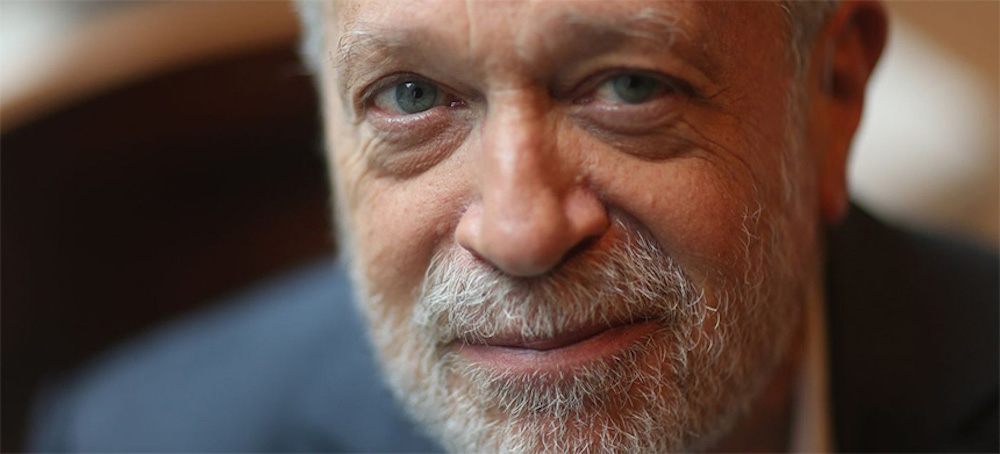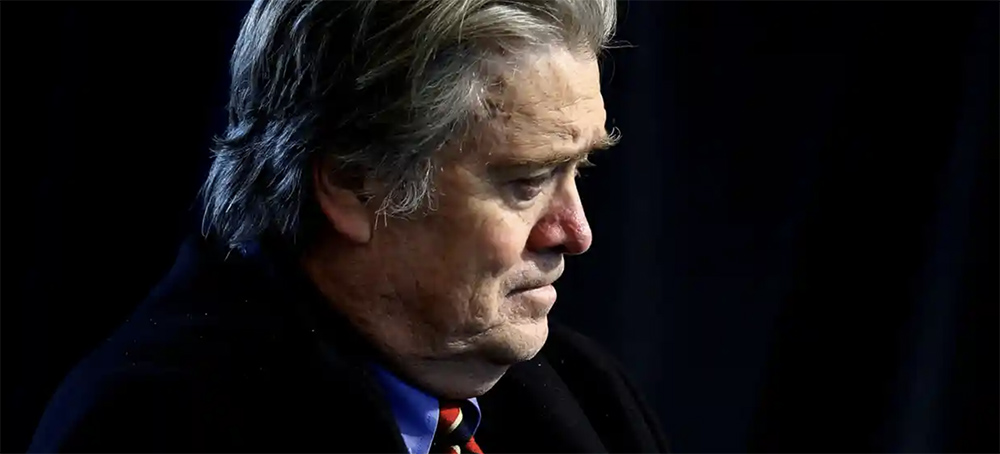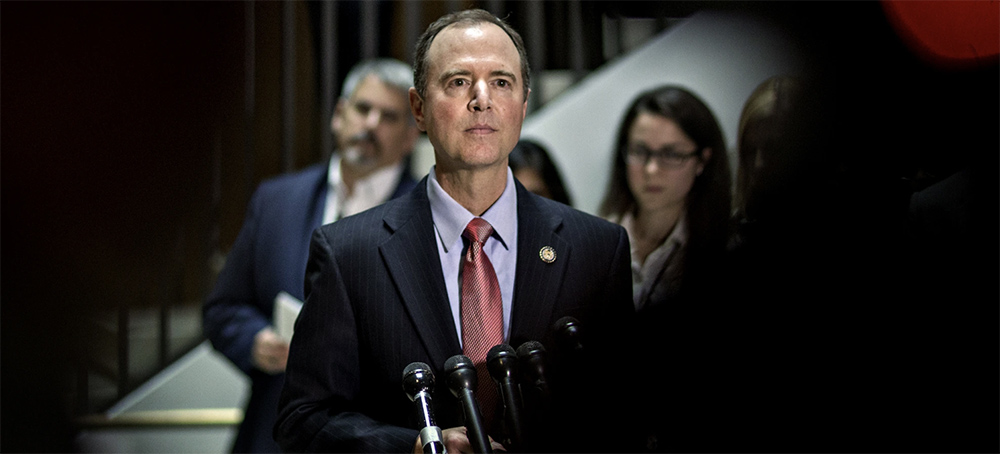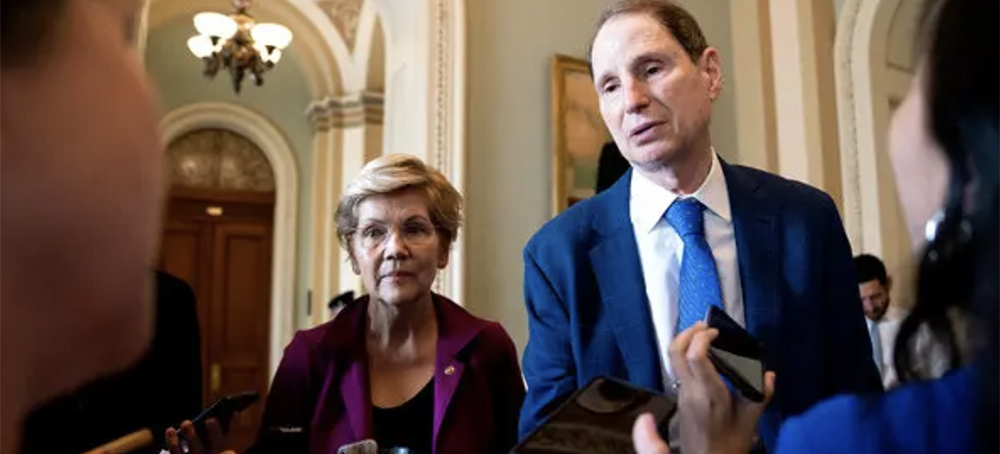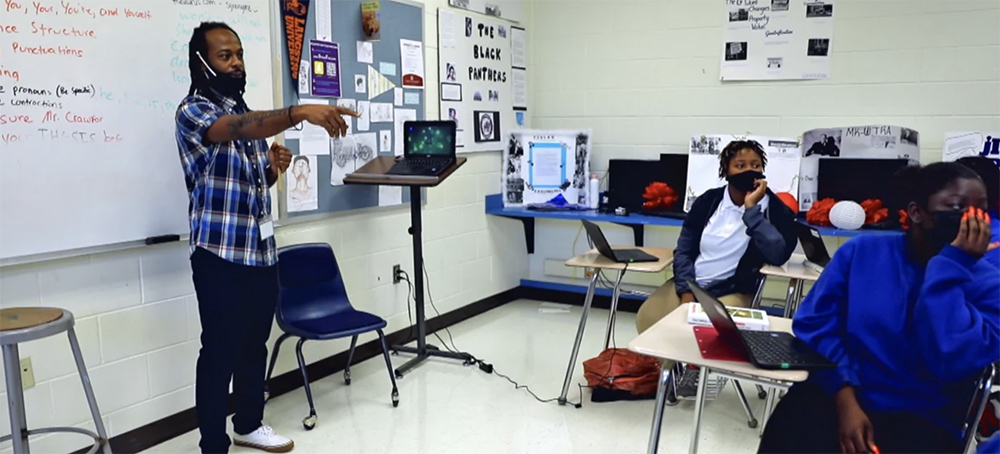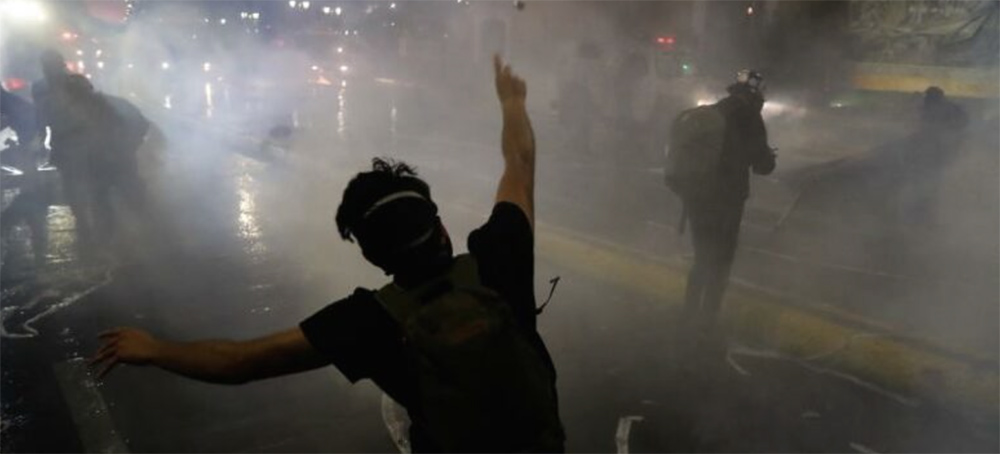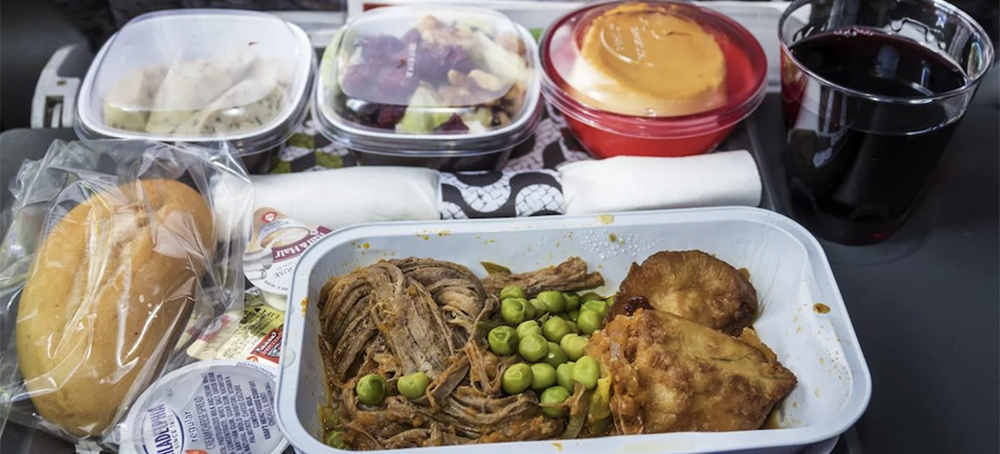Live on the homepage now!
Reader Supported News
Corporate giants are raising prices even as they rake in record profits. How can this be? Because of their unchecked power
Republicans are hammering Biden and Democratic lawmakers over inflation – and attacking his economic stimulus plans as wrongheaded. “This will be a winter of high gas prices, shortages and inflation because far left lunatics control our government,” Marco Rubio, the Republican senator from Florida posted on Twitter Thursday.
A major reason for price rises is supply bottlenecks, as Jerome Powell, chair of the Federal Reserve, has pointed out. He believes they’re temporary, and he’s probably right.
But there’s a deeper structural reason for inflation, one that appears to be growing worse: the economic concentration of the American economy in the hands of a relative few corporate giants with the power to raise prices.
If markets were competitive, companies would keep their prices down in order to prevent competitors from grabbing away customers.
But they’re raising prices even as they rake in record profits. How can this be? They have so much market power they can raise prices with impunity.
Viewed this way, the underlying problem isn’t inflation per se. It’s lack of competition. Corporations are using the excuse of inflation to raise prices and make fatter profits.
In April, Procter & Gamble announced it would start charging more for consumer staples ranging from diapers to toilet paper, citing “rising costs for raw materials, such as resin and pulp, and higher expenses to transport goods”.
But P&G is making huge profits. In the quarter ending 30 September, after some of its price increases went into effect, it reported a whopping 24.7% profit margin. It even spent $3bn during the quarter buying its own stock.
It could raise prices and rake in more money because P&G faces almost no competition. The lion’s share of the market for diapers, to take one example, is controlled by just two companies – P&G and Kimberly-Clark – which roughly coordinate their prices and production. It was hardly a coincidence that Kimberly-Clark announced price increases similar to P&Gs at the same time P&G announced its own price increases.
Or consider another consumer product duopoly – PepsiCo (the parent company of Frito-Lay, Gatorade, Quaker, Tropicana, and other brands), and Coca-Cola. In April, PepsiCo announced it was increasing prices, blaming “higher costs for some ingredients, freight and labor”. Rubbish. The company didn’t have to raise prices. It recorded $3bn in operating profits through September.
If PepsiCo faced tough competition, it could never have gotten away with this. But it doesn’t. To the contrary, it appears to have colluded with Coca-Cola – which, oddly, announced price increases at about the same time as PepsiCo, and has increased its profit margins to 28.9%.
You can see a similar pattern in energy prices. If energy markets were competitive, producers would have quickly ramped up production to create more supply, once it became clear that demand was growing. But they didn’t.
Why not? Industry experts say oil and gas companies saw bigger money in letting prices run higher before producing more supply. They can get away with this because big oil and gas producers don’t operate in a competitive market. They can manipulate supply by coordinating among themselves.
In sum, inflation isn’t driving most of these price increases. Corporate power is driving them.
Since the 1980s, when the US government all but abandoned antitrust enforcement, two-thirds of all American industries have become more concentrated.
Monsanto now sets the prices for most of the nation’s seed corn.
The government green-lighted Wall Street’s consolidation into five giant banks, of which JP Morgan is the largest.
Airlines have merged from 12 in 1980 to four today, which now control 80% of domestic seating capacity.
Boeing and McDonnell Douglas have merged, leaving the US with just one large producer of civilian aircraft: Boeing.
Three giant cable companies dominate broadband: Comcast, AT&T and Verizon.
A handful of drug companies control the pharmaceutical industry: Pfizer, Eli Lilly, Johnson & Johnson, Bristol-Myers Squibb and Merck.
All this spells corporate power to raise prices.
So what’s the appropriate response to the latest round of inflation?
The Federal Reserve has signaled it won’t raise interest rates for the time being, believing that the inflation is being driven by temporary supply bottlenecks.
Meanwhile, Biden administration officials have been consulting with the oil industry in an effort to stem rising gas prices, trying to make it simpler to issue commercial driver’s licenses (to help reduce the shortage of truck drivers), and seeking to unclog overcrowded container ports.
But none of this responds to the deeper structural issue – of which price inflation is a symptom: the increasing consolidation of the economy in a relative handful of big corporations with enough power to raise prices and increase profits.
This structural problem is amenable to only one thing: the aggressive use of antitrust law.
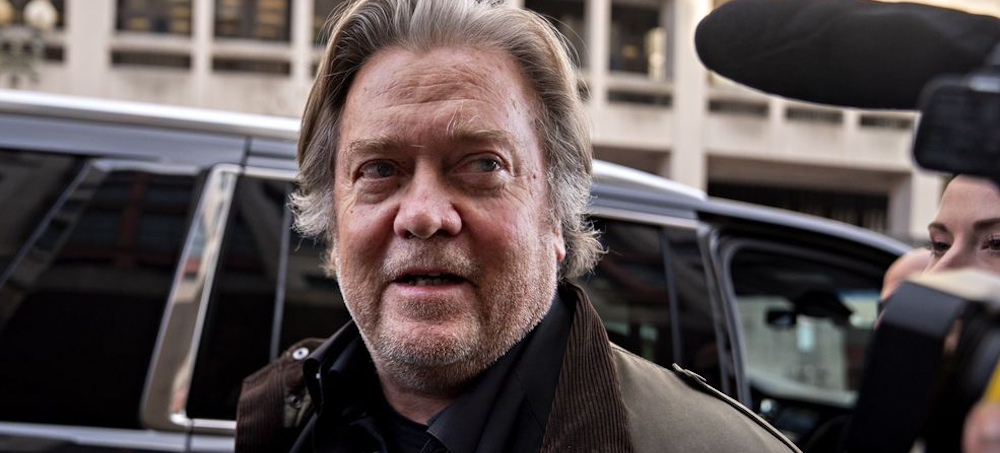 Steve Bannon, once chief strategist to then-president Donald Trump, has been charged by the Justice Department with criminal contempt of Congress. (photo: Andrew Harrer/Bloomberg)
Steve Bannon, once chief strategist to then-president Donald Trump, has been charged by the Justice Department with criminal contempt of Congress. (photo: Andrew Harrer/Bloomberg)
Bannon, who was a political adviser to then-President Donald Trump, is charged with one count for failing to appear for a deposition and another for refusing to hand over documents.
The Justice Department's move exposes Bannon to fines and as much as a year of jail time for each count. It follows weeks of deliberation by prosecutors in the U.S. Attorney's Office for the District of Columbia, who will oversee the criminal case.
"Since my first day in office, I have promised Justice Department employees that together we would show the American people by word and deed that the department adheres to the rule of law, follows the facts and the law and pursues equal justice under the law," Attorney General Merrick Garland said in a statement. "Today's charges reflect the department's steadfast commitment to these principles."
A Justice Department official, who was not authorized to speak on the record, said Bannon is expected to surrender Monday and appear in court that afternoon.
Bannon refused to cooperate with the House panel investigating the storming of the Capitol, arguing he was covered under an assertion of executive privilege by Trump.
But legal experts said that claim lacked merit because Bannon is a private citizen who had not worked inside the White House for years — and because the current president, Joe Biden, had waived privilege on several matters before the House committee.
Bannon not only declined to share documents, but he also refused to show up for testimony with the committee. The House voted to approve a criminal contempt referral for him last month.
Implications for the select committee's work
Defense attorneys in Washington had been expecting the Justice Department to draw a line with Bannon. Indeed, a decision not to proceed against Bannon could have spurred others to decline to cooperate and could have short-circuited the entire House investigation.
The chair of the select committee, Rep. Bennie Thompson, D-Miss., has signed dozens of subpoenas in recent weeks for people in and outside the Trump administration.
"Steve Bannon's indictment should send a clear message to anyone who thinks they can ignore the Select Committee or try to stonewall our investigation: no one is above the law," said Thompson and Vice Chair Liz Cheney, R-Wyo., in a statement. "We will not hesitate to use the tools at our disposal to get the information we need."
The panel appears to be proceeding along multiple tracks: knocking at the doors of Trump's inner circle in the White House, as well as those who attended meetings at the Willard hotel and elsewhere leading up to Jan. 6.
The conundrum of Bannon in particular
Scholars who study the issue of executive privilege said the decision about Bannon is more complex than the public may appreciate.
Jonathan Shaub, a law professor at the University of Kentucky, pointed out in a recent post on the Lawfare website that the Justice Department has frequently declined to prosecute government officials for contempt after the president decides to assert executive privilege — and it's not clear how persuasive an assertion by a former president would be in the courts.
Garland had asserted any decision about Bannon would be made based on the facts and the law — not politics.
But that became complicated, too, after Biden told reporters he thought people who defied the Jan. 6 committee should face prosecution.
A spokesman for the Justice Department, Anthony Coley, said the department would "make its own independent decisions in all prosecutions. ... Period. Full stop."
Bannon's complicated ties to the White House
Bannon, 67, has had other recent brushes with the law. In the waning hours of Trump's presidency this year, Trump pardoned Bannon, allowing him to avoid trial after federal prosecutors in New York accused him of defrauding people who donated to build a wall along the United States' southern border.
"Mr. Bannon has been an important leader in the conservative movement and is known for his political acumen," Trump's press secretary, Kayleigh McEnany, said at the time.
Bannon fell out of favor with Trump in 2017, leading to his ouster as a top strategist in the White House. But the two mended relations, at least somewhat, and by January, Bannon was touting the rally in Washington on his War Room podcast.
"All hell is going to break loose tomorrow," Bannon told his audience on Jan. 5, only hours before the storming of the Capitol.
 Danny Fenster was detained at Yangon international airport in May. (photo: Reuters)
Danny Fenster was detained at Yangon international airport in May. (photo: Reuters)
Fenster, the managing editor of the online magazine Frontier Myanmar, was also found guilty of contacting illegal organizations and violating visa regulations, lawyer Than Zaw Aung said. He was sentenced to the maximum term on each charge.
Fenster has been detained since May. He still faces two additional charges in a different court for allegedly violating the counterterrorism law and a statute covering treason and sedition.
"Everyone at Frontier is disappointed and frustrated at this decision. We just want to see Danny released as soon as possible so he can go home to his family," Editor-in-Chief Thomas Kean said in a statement after the sentencing.
Fenster was detained at Yangon International Airport on May 24 as he was about to board a flight to go to the Detroit area in the United States to see his family.
He is the only foreign journalist to be convicted of a serious crime since the army seized power in February, ousting the elected government of Aung San Suu Kyi.
The military-installed government has cracked down hard on press freedom, shutting virtually all critical outlets and arresting about 100 journalists, roughly 30 of whom remain in jail. Some of the closed outlets have continued operating without a license, publishing online as their staff members dodge arrest.
The army takeover was met by widespread peaceful protests that were put down with lethal force. The Assistance Association for Political Prisoners has detailed the deaths of more than 1,200 civilians, in addition to about 10,000 arrests. Armed resistance has since spread, and U.N. experts and others observers fear the incipient insurgency can slide into civil war.
Despite testimony from more than a dozen prosecution witnesses, it was never clear what Fenster was alleged to have done. Much of the prosecution's case appeared to hinge on his being employed by one of the media outlets, Myanmar Now, that had been ordered closed this year. But Fenster had left his job at Myanmar Now in July last year, joining Frontier Myanmar the following month.
"The court disregarded a significant amount of evidence of his employment at Frontier, including tax and social security records and testimony from a Frontier employee," said the statement from Frontier Myanmar.
"There is absolutely no basis to convict Danny of these charges. His legal team clearly demonstrated to the court that he had resigned from Myanmar Now and was working for Frontier from the middle of last year," it quoted Kean as saying.
Fenster's next challenge is the two additional charges that his lawyer said Monday had been filed in a different court in Yangon.
Than Zaw Aung said Monday that one of the new charges comes under a section of the Counterterrorism Act that is punishable by from 10 years to life in prison. The military-installed government has said it would apply the law harshly in cases involving opposition organizations it has deemed to be "terrorist." Involvement can include contacting such groups, or reporting their statements.
The other charge is under the penal code and is usually referred to as treason or sedition. It carries a penalty of seven to 20 years' imprisonment.
The hearings on the original three charges were held at the court in Yangon's Insein Prison, where Fenster is jailed. They were closed to the press and the public. Accounts of the proceedings have come from Fenster's lawyer.
The U.S. government, press freedom associations and Fenster's family had pressed strongly for the 37-year-old journalist's release.
"We remain deeply concerned over the continued detention of Danny Fenster. He was working as a journalist in Burma when he was detained," State Department spokesman Ned Price said last week, referring to Myanmar's name before it was changed in 1989 by a previous military government.
"His detention, the detention of so many others is a sad reminder of the continuing human rights, humanitarian crisis facing the country of Burma, facing the Burmese, but also facing foreign nationals, including Americans who happen to be in Burma," Price said. "The profoundly unjust nature of Danny's detention is plain for all the world to see and these charges only put a further spotlight on that. Again, the regime should take the prudent step of releasing him now."
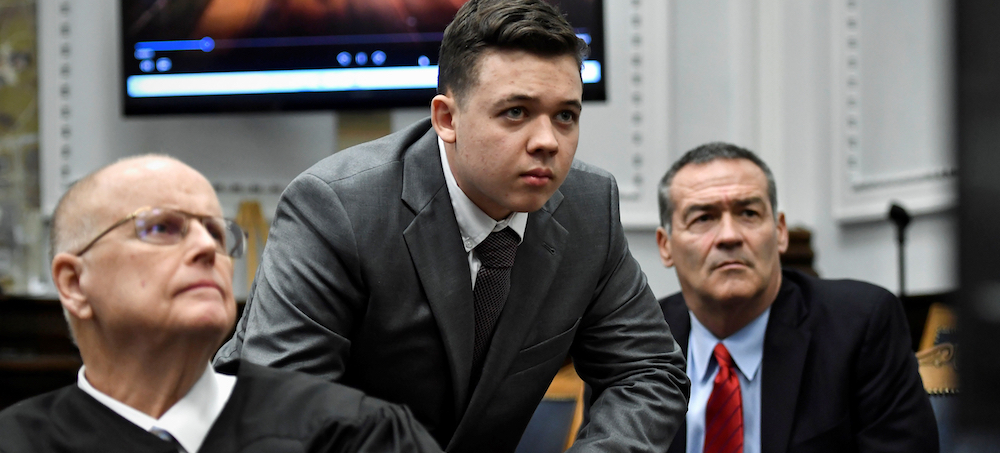 Judge Bruce Schroeder watches an evidence video with Kyle Rittenhouse and his attorney Mark Richards during proceedings at the Kenosha County Courthouse in Kenosha, Wisconsin, Nov. 12, 2021. (photo: Sean Krajacic/Reuters)
Judge Bruce Schroeder watches an evidence video with Kyle Rittenhouse and his attorney Mark Richards during proceedings at the Kenosha County Courthouse in Kenosha, Wisconsin, Nov. 12, 2021. (photo: Sean Krajacic/Reuters)
ALSO SEE: The Judge in Kyle Rittenhouse's Trial
Is Considering Lesser Charges. Here's What That Means
Closing arguments are expected Monday in the trial of Kyle Rittenhouse, who fatally shot two people during protests in Kenosha last year.
Closing arguments are expected Monday in the trial.
Rittenhouse, 18, fatally shot two men and wounded a third during protests in Kenosha following the police shooting of Jacob Blake last year.
He is charged with intentional homicide, reckless homicide, attempted intentional homicide, and other charges in the Aug. 25, 2020, shooting.
The Wisconsin National Guard will stage outside Kenosha, available should they be requested by law enforcement, Gov. Tony Evers said.
“I urge folks who are otherwise not from the area to please respect the community by reconsidering any plans to travel there and encourage those who might choose to assemble and exercise their First Amendment rights to do so safely and peacefully,” Evers said in a statement.
Rittenhouse, who was 17 at the time of the shooting, went to Kenosha armed with a semi-automatic rifle. He has said he was there to protect businesses following unrest in the city.
He testified he fired in self-defense after he was attacked. Anthony Huber, 26, and Joseph Rosenbaum, 36, were killed in the shooting, and Gaige Grosskreutz, 27, was injured.
Prosecutors argued that Rittenhouse was unjustified in using deadly force.
The prosecution said Rittenhouse, who lives in Antioch, Illinois, about 20 miles away from Kenosha, was among those who were “drawn to the chaos” in the Wisconsin city and who added to the chaos there.
The protests were in reaction to the police shooting of Blake, a Black man, by a white officer on Aug. 23, 2020. Blake was left paralyzed from the waist down.
After closing arguments, the jury will begin deliberations.
Rittenhouse faces life in prison if convicted on the first-degree intentional homicide charge, and up to 60 years on each of the other homicide-related charges. He is also charged with two reckless endangerment counts, which carry up to 12 years each, and a misdemeanor weapons charge that carries a potential nine-month sentence.
 Protesters march on 60th Street in Sudan's capital, Khartoum. (photo: Getty Images)
Protesters march on 60th Street in Sudan's capital, Khartoum. (photo: Getty Images)
Protests come two days after coup leader Abdel Fattah al-Burhan reappointed himself head of the Sovereign Council.
“One protester was killed in Omdurman by the bullets of the putschist military council,” the Central Committee for Sudanese Doctors said in a statement on Saturday. It added that others were wounded by “live rounds” fired by security forces.
Earlier, witnesses said security forces had fired tear gas to disperse protesters in the capital, Khartoum, and its twin city of Omdurman. Despite disruption of communication networks, demonstrations also broke out in the city of Wad Madani, south of Khartoum.
Al Jazeera’s Hiba Morgan, reporting from Khartoum, said there was a heavy security presence across the capital.
“There are concerns that there will be violence because of the spread of security forces, not just on the main bridges around the capital but also on the main streets,” Morgan said.
“Activists and protesters have put out a list of hospitals where they say people should head out to should there be violence,” she added.
The “million-person” marches on Saturday come two days after coup leader General Abdel Fattah al-Burhan reappointed himself head of the Sovereign Council, Sudan’s interim governing body.
Thursday’s move angered the pro-democracy alliance and frustrated Western countries that have urged the military to reverse its coup.
The Sudanese military seized power on October 25, dissolving the transitional government and arresting dozens of officials and politicians. The takeover upended the country’s fragile planned transition to democratic rule, more than two years after a popular uprising forced the removal of longtime leader Omar al-Bashir.
Saturday’s protests were called by the Sudanese Professionals’ Association and the Resistance Committees. Both groups were primary forces behind a popular uprising that led to the military overthrow of Omar al-Bashir in April 2019.
Both groups have opposed the return to the power-sharing deal that established the deposed transitional government in August 2019. They demand the handover of the government to civilians to lead the transition to democracy, with other political parties and movements joining the call.
The United Nations envoy in Sudan, Volker Perthes, urged security forces to “exercise utmost restraint” during the planned protests and called for demonstrators to “maintain the principle of peaceful protest.”
Since the takeover, at least 15 anti-coup protesters have been killed due to excessive force by the country’s security forces, according to Sudanese doctors and the UN.
Ongoing mediation efforts seek to find a way out of the crisis.
Perthes said he held “good discussions” Friday with representatives of the resistance committees in Khartoum, civil society activists and Mohammed Hassan al-Taishi, who was a civilian member of the dissolved sovereign council. Nasredeen Abdulbari, justice minister of the deposed government, also took part.
 A Bengal tiger. (photo: Shutterstock)
A Bengal tiger. (photo: Shutterstock)
Strong protections have allowed the rhino population to grow. They’ve also benefited another, much more elusive, mammal in Chitwan.
We leave the canoe and go ashore with local guide Hem Subedi. He points to the muddy riverbank: fresh pawprints. One of Chitwan’s approximately 100 Bengal tigers (Panthera tigris tigris) has recently passed through.
There were only a handful of the big cats in the 750 square kilometers (290 square miles) that constituted Chitwan National Park when it was founded in 1973. Since then, Chitwan has grown to 932 km2 (360 mi2), and its tiger population has increased with it.
In 2010, Nepal and the 12 other countries with wild tiger populations came up with an ambitious plan: Double the population of tigers in the wild by 2022, the next Year of the Tiger in the Chinese zodiac. In the decade since then, however, Nepal is the only country that has even come close to achieving that goal. From 121 tigers in 2010, there are now about 240 in Nepal’s various national parks and adjacent protected areas, with the government aiming for 250 by 2022.
“Nepal is a leading country which other countries, like India, want to replicate,” Ram Aryal, from the environmental NGO the National Trust for Nature Conservation (NTNC), says at his office on the outskirts of Chitwan.
Tiger conservation here involves people at various levels, from government officials to local farmers. Communities living in and around tiger habitats benefit from the revenue that tiger-seeking tourists bring, with the money filtering down to schools and farmers.
“To only impose laws will not be enough. Now people actually feel that this is my tiger, my rhino, that we need to protect [the wildlife],” Aryal says.
His organization has for the past three decades worked on conservation in the Terai Arc, a vast swath of lowland terrain that sweeps across Nepal and India, and which includes Chitwan. In the national park, the NTNC has worked on various sustainability projects that bring together thousands of local community members.
To sustain a healthy population of wild tigers, two key factors are space and prey. Aryal estimates Nepal could hold up to 700 tigers if the buffer zones adjacent to the national parks are expanded, and more wildlife corridors between protected areas are created. Best case, the tiger population could double in just five years, he says.
Doubling the numbers
The recent history of tigers is a bleak one. A century ago there were about 100,000 wild tigers spread across Asia’s various landscapes. By the early 2000s, that number had plummeted by 95%, due largely to poaching and loss of habitat. What used to be nine subspecies have been whittled down to six, with the Javan, Bali and Caspian tigers going extinct. Vietnam, Laos and Cambodia lost their tigers, and the big cats are now restricted to just 13 countries: Nepal, India, Bangladesh, Bhutan, China, Indonesia, Myanmar, Malaysia, Thailand and Russia.
By 2010, when the range countries decided to double the population, there were an estimated 3,200 tigers left in the wild. Today that number is about 4,000, but this is dwarfed by the estimated 5,000 to 10,000 tigers held in captivity in the U.S. alone, and the unknown number kept on Chinese tiger farms. Those latter populations suggest tigers as a species aren’t going extinct any time soon. So why the urgency to double the wild population?
“As an umbrella species the tiger represents a living environment, and protecting it we also protect all other species living in that environment,” Aryal says.
Poaching on the decrease
A key factor in Nepal’s success is something that other range countries are missing: strong enforcement against poaching. Nepal’s zero-poaching approach means no tigers have been shot in a decade. The knock-on effect has been a reduction in poaching of elephants and rhinos — but only within its borders. Nepal’s geographical position, wedged between India and China, makes it an important transit country for the smuggling of animal products.
Conservation efforts have therefore also involved the military, with heavily armed soldiers patrolling parks like Chitwan. They use drones and surveillance cameras, along with sniffer dogs, elephants, jeeps, motorbikes, boats and bicycles. Nepalese law prohibits all hunting, apart from trophy hunting of a few species. Poaching, even of common species such as wild boar and deer, can result in long prison sentences; killing a tiger carries a life sentence. These militarized tactics have also led to allegations of human rights abuses by park guards against Indigenous communities including the use of torture and the destruction of homes.
Increased territories
An individual tiger requires territory of about 50 km2 (19 mi2) and prey density of 150 animals/km2 (about 390 animals/mi2). The problem is that there’s currently not enough of either to support a growing tiger population. The big cats are extremely territorial, and there have been several recent incidents in Chitwan where tigers have killed each other in fights over the limited space. Nepal’s protected areas already cover about a quarter of the country’s total area, among the highest rates in Asia, and the government is considering expanding the buffer zones that ring the national parks.
The target figure of 250 tigers would need 12,500 km2 (4,800 mi2) of territory, but the current five protected tiger zones only cover about 5,200 km2 (2,000 mi2), with prey density of about 56 animals/km2 (145 animals/mi2). Surrounding these parks, however, are another 40,000 km2 (15,400 mi2) of forests, grasslands and agricultural lands, all of which were historically tiger domain.
A feasible solution, conservationists say, would therefore be to expand the tiger zones into these areas and include local communities already living there.
Living close to tigers
The Baghmara community forest is part of the buffer zone next to Chitwan National Park. It’s home to 5,600 people who rely on the forest for firewood and other resources. Tigers and other wildlife used to roam the area, but in the 1990s trees were planted here, making it less suitable as tiger habitat. Today, tourists come here to spot the park’s tigers and rhinos while riding on the backs of elephants or paddling in canoes. They brought in about $500,000 in revenue annually before the COVID-19 pandemic hit. One-third of that revenue goes to the community, including for maintaining roads and building schools, where students are taught the importance of conserving tigers.
Around Chitwan, electric fences and concrete walls have been erected to reduce conflicts between humans and wildlife. Farmers are compensated for crops ruined by rhinos and elephants, or livestock killed by tigers and leopards.
Kul Tamang is one of many rangers patrolling the forest in Baghmara. Armed with just a wooden cane, he follows a narrow path that winds through the forest. He’s been doing this for the past 15 years, and says he knows every rock and tree — something he evidently takes great pride in.
“Everyone here respects the tiger. It’s the jewel of the forest — symbolizing power,” he says. “The tigers also give us work since they attract tourists.”
For many in the community, positive perceptions of the tigers are a matter of economics: the 180,000 visitors to the park annually (or at least before the pandemic) come to see live tigers, not dead ones. And while many locals have lost water buffaloes, cows, goats — even family members when they stray into the park to cut grass or collect firewood — to the tigers and leopards and rhinos, there’s a growing acceptance of the wildlife on their doorstep.
Mani Raut lives near Sauraha, the eastern gateway for tourists entering Chitwan. In 2019, a tiger killed her water buffalo, which was worth about $1,000. Since the buffalo was inside the park when it was attacked, Mani wasn’t eligible for compensation under the community payout scheme. Still, she says she understands the importance of the park to the community’s development.
“The tourism creates opportunities for us,” she says. “Both my son and daughter want to work as tourist guides in the park.”
The Living with Tigers program, supported by the Darwin Initiative, a U.K. government grants scheme, started in 2015 to raise awareness among local communities in Chitwan and Royal Bardia National Park, in western Nepal. The program includes livestock management, with predator-safe corals built of wire and rope. It also involves generating biogas from cow and buffalo dung, thereby reducing the need for locals to venture into the park to collect firewood. The program covers 1,200 households and 5,000 people, and campaigns through social media and local radio. Social surveys conducted as part of the program show that local attitudes toward the tigers are changing.
“The attitude is usually more positive and people are ready to change their behaviors,” says Prakash Chapagain, field coordinator of Living with Tigers.
He adds the tiger population in places like Chitwan can grow substantially if the right measures are taken. That means managing and increasing the area of wetlands and grasslands — “animal-friendly areas” — so that deer and other prey species can thrive.
Budwa Bote arrived in Chitwan with his family 20 years ago, settling into a small clay house on a plot of land on the outskirts of Sauraha. Like many here, he has lost water buffaloes to tigers. Budwa himself has also been attacked by a tiger. He also tells of elephants raiding his crops, and shows the severe leg injuries he suffered during an encounter with a sloth bear in the forest, as well as deep scars on his buttocks when he was gored by a rhino.
Even if he wanted to move, he says, he can’t; his livelihood depends on his being here in the midst of the tigers and rhinos.
“I need to enter the forest to fish so that I can feed my family,” he says. The Bote are an Indigenous community that relies on fishing the Chitwan River using traditional throw nets. While the park officially allows 250 permit holders to fish on the periphery of the protected area, no new permits are being issued or lapsed permits renewed, according to a report by The Third Pole.
Budwa says he hopes the government will expand the number of fences and walls that keep the animals out of the villages. Living next to tigers is something he says he has come to accept; his family is opening a homestay to tap into the tourism revenue.
“This area is also home to the animals,” Budwa says. “If we can’t accept that, we will have to move elsewhere.”
This article was originally published on Mongabay.
Follow us on facebook and twitter!
PO Box 2043 / Citrus Heights, CA 95611

